Veterinary Critical Care—Intensive Care for Pets
Veterinary Services

Veterinary Critical Care—Intensive Care for Pets
Some pet owners may be confused about what constitutes emergency veterinary medicine and veterinary critical care. When your pet suffers a medical emergency, they will be seen by an emergency veterinary team who will stabilize their condition. They will then be transferred to a critical care unit for monitoring and treatment as they recover. Some pets may also need critical care for some days following certain surgeries. The emergency and critical care team at Florida Veterinary Referral Center is available 24 hours per day, seven days per week, in case your pet requires emergency assistance.
The Critically Ill Pet’s Rule of 20
Twenty critical parameters should be monitored at least daily in a critically ill pet. Critical care veterinarians use this list to ensure that each pet’s status is comprehensively monitored so that they receive the best possible care.
Fluid balance — Pets require adequate perfusion and hydration without overloading their system. Your pet’s perfusion and hydration status will be evaluated based on their heart rate, blood pressure, mucous membrane color, and pulse quality.
Albumin — This extremely important protein is frequently lost when your pet suffers a critical illness. Albumin measurements lower than 2 g/dL typically have a poor prognosis. Plasma and albumin transfusions can be administered to supplement albumin levels when they become dangerously low.
Glucose — Glucose levels should be maintained between 80 and 120 mg/dL. Conditions such as sepsis, heatstroke, and kidney disease can cause hypoglycemia, causing extreme weakness or seizures. Insulin treatment for hyperglycemia is important to offset diabetic complications.
Electrolytes — Potassium, sodium, ionized calcium, phosphorus, magnesium, and chloride must be monitored closely for fluctuations, which can disturb the pet’s neurologic status, cardiovascular system, and acid-base balance.
Acid-base balance — Blood acidosis or alkalosis, which can be caused by metabolic or respiratory factors, will be addressed depending on the originating problem.
Oxygenation — Pneumonia, congestive heart failure, and many other conditions can significantly compromise your pet’s lung function. Oxygen supplementation will be offered if your pet’s oxygenation drops below safe levels.
Neurologic status — Your pet’s consciousness level will be assessed on an objective scale to ensure they are not declining. Liver disease, acidosis, shock, and increased intracranial pressure can all result in neurologic deficits.
Blood pressure — For adequate organ perfusion, blood pressure should be maintained at greater than 60 mmHg. If your pet’s blood pressure drops below this level, treatment may include intravenous fluids, oxygen therapy, and pain control.
Heart function — Your pet’s heart rate, rhythm, and ability to contract will be assessed frequently. Arrhythmias can result in decreased cardiac output and shock.
Temperature — Increased temperature can be caused by heatstroke, exercise, infection, inflammation, or cancer. Decreased temperature can indicate shock.
Clotting ability — A condition called disseminated intravascular coagulation can occur in any pet who suffers a severe critical issue. In the early stages, your pet may not exhibit any signs, but if the condition progresses, their prognosis for survival is poor.
Red blood cell (RBC) concentration — When RBC concentrations drop below normal, your pet will experience anemia, which can cause weakness and altered mentation, and they may require a blood transfusion.
Kidney function — If your pet has had a hypotensive episode, they are receiving medications that could damage their kidneys, or they have primary kidney failure, their kidney function will be evaluated daily.
Immune status — If your pet develops an infection, catching the issue promptly increases your pet’s ability to clear the infection.
Gastrointestinal (GI) motility — Critically ill pets are prone to decreased GI motility, and their abdominal noise will be evaluated several times a day. A nasogastric tube may be placed if your pet develops slow intestinal motility.
Medications — Every drug your pet is administered is reviewed daily to ensure the dosage is accurate and that no interactions can occur if other medications are administered.
Nutrition — If your pet’s nutritional needs are not met, they can develop GI dysfunction, organ dysfunction, and delayed wound healing. A feeding tube will be placed if your pet cannot eat enough to meet their nutritional requirements.
Pain control — In addition to objective physical parameters such as heart rate and mucous membrane color, your pet’s body language will be assessed to determine if they are painful. Pain activates your pet’s stress hormones, and can cause worsening illness and delayed wound healing.
Wound care — Your pet’s bandages will be changed regularly and wounds assessed and treated appropriately.
Nursing care — Each critically ill patient has different needs. Recumbent pets will be turned every four hours to prevent bedsores, catheter sites will be monitored for infection or displacement, and urine and fecal soiling will be immediately cleaned.
As you can see, veterinary critical care is complex and requires the expertise of an experienced veterinary criticalist. Our experienced critical care team offers intensive treatment to your pet when they are at their most vulnerable. Their every need is addressed promptly by a concerned veterinary professional. If your pet is affected by a medical emergency, contact FVRC’s emergency and critical care department promptly.
